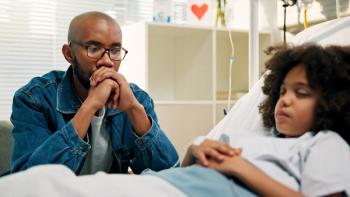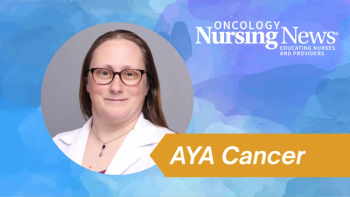
- April 2014
- Volume 8
- Issue 3
Late-Effects Clinic, Passport for Care Support Survivors of Childhood Cancers
As oncology nurses, we have too often seen young adults who, successfully cured of their childhood cancers, return with serious or debilitating health concerns or even a secondary malignancy as a late effect from chemotherapy or radiation.
Kathryn Wells, RN, MS, CPNP, CPON
As oncology nurses, we have too often seen young adults who, successfully cured of their childhood cancers, return with serious or debilitating health concerns or even a secondary malignancy as a late effect from chemotherapy or radiation. While many pediatric cancer patients do not suffer late effects, many do, particularly those whose childhood cancers are treated intensively. A child’s growth and development during their care can further complicate these medical issues. Over time, these effects can have a profound impact on their lives.
The childhood cancer survival rate has surged to 80% over the past several decades, but more than 70% of the 350,000 survivors will develop adverse health effects, and 25% to 40% of those will be severe or life threatening.1 Depending on the treatments and types of tumors targeted, these effects may include growth and development problems or delays, new cancers, diminished organ function, neuropathy, cognitive impairment, and psychological or emotional problems.
As providers, we can’t solve all of these problems, but with the right resources, we can recognize them, monitor them, make referrals, and educate our patients and their families. At UC Davis Comprehensive Cancer Center, where we see up to 75 newly diagnosed pediatric cancer patients each year, we have implemented a lateeffects program to help us do this.
The program uses an innovative computer tool known as Passport for Care to help predict the kinds of late effects patients may face as a result of their treatment, and guides clinicians, patients, and their families on how to watch for and manage them. We use the tool with our pediatric patients who participate in our GREAT (Getting Regular Evaluations After Treatment) clinic. Passport for Care was developed by Marc Horowitz, MD, a pediatric hematologist-oncologist at the Texas Children’s Cancer Center, in collaboration with the Baylor College of Medicine in Houston, Texas, where he is a professor in the Department of Pediatrics, Hematology-Oncology section, and the Children’s Oncology Group, a National Cancer Institute—supported clinical trials group.
The tool addresses many problems confronting childhood cancer survivors. Many of these survivors don’t fully understand their disease. They may lack information about the treatments they received and their long-term health implications. They may not have received good posttreatment care plans, and they may have experienced frequent changes in their medical providers, including general practitioners who are not trained to deal with late effects of cancer treatment.
Passport for Care works by assembling survivor care recommendations that are individualized based on the survivor’s treatment history. It also provides end-of-treatment care summaries and customized educational resources. More than 100 institutions now use Passport for Care, and more than 10,000 patients are enrolled.
Our patients and their families have embraced this approach. Evan Whisenant, one of our young patients, was diagnosed at age 5 with hypodiploid acute lymphoblastic leukemia. She endured a grueling treatment regimen including intensive chemotherapy followed by a bone marrow transplant. Preparation for the transplant included total body radiation with a boost to the brain. The treatments were successful, and today she is a beautiful and buoyant 9-year-old.
But Evan has experienced numerous late effects, including cataracts, osteoporosis, melanoma, diminished lung function, and cognitive delays. She is not expected to reach puberty without medical intervention, and she almost assuredly will be infertile.
Her clinic visits and use of the Passport for Care have allowed me to regularly assess Evan’s health. I use evidence-based information to screen for general overall health, along with late effects she may be at particular risk for, based on her exposures during treatment. I order blood work and bone scans and refer her to specialty clinics when needed. She sees a dermatologist for the recurrent melanoma, an endocrinologist to help manage concerns about the onset of puberty, and an ophthalmologist for regular eye exams.
Our social worker spends time with her and her parents to make sure she is feeling supported at school and that she has access to community resources. I provide her parents with a thorough accounting of her clinic visits, any treatments she has received, plus educational materials on each of the specific areas of concern.
The step-by step guidance has been a great comfort to Evan’s family, who appreciate knowing what they might experience before it has the potential to become a crisis. Evan, too, seems pleased. At our last visit she presented me with three hand-painted watercolors that I keep on display in my office.
As a pediatric oncology specialist, I am proud of our professional accomplishments in finding the treatments that have dramatically increased pediatric cancer survivorship. Following these children as they grow older and face late effects of those treatments is an equally important task.
Reference
- Oeffinger KC, Mertens AC, Sklar CA, et al. Chronic health conditions in adult survivors of childhood cancer. N Engl J Med. 2006;355(15):1572- 1582.
Articles in this issue
over 11 years ago
Fertility Preservation-How Well Informed Are You?over 11 years ago
SGO Clinical Practice Statement: Genetic Testing for Ovarian Cancerover 11 years ago
Addressing Sexual Concerns in Breast Cancer Patients and Survivorsover 11 years ago
Lung Cancer Treatment Challenges and Opportunitiesover 11 years ago
Evidence-Based Approaches to Survivorship Careover 11 years ago
Promoting a Culture of Safe Handlingover 11 years ago
Palliative Care Is a Priority-Nationally and WorldwideNewsletter
Knowledge is power. Don’t miss the most recent breakthroughs in cancer care.































































































